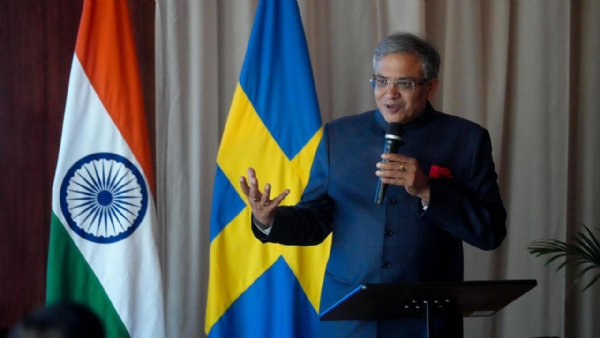
Delhi, 11 June (H.S.): Gyanesh Kumar, Chief Election Commissioner (CEC) of India, highlighted India's electoral integrity, scale, and diversity in his keynote address at the Stockholm International Conference on Electoral Integrity. He reaffirmed the Election Commission of India’s (ECI) role in capacity building for Election Management Bodies (EMBs) worldwide, emphasizing the commitment to conducting elections with integrity. The conference hosted over 100 participants from around 50 countries, organized by the International Institute for Democracy and Electoral Assistance (International IDEA).
Kumar detailed the massive scale of India's election exercise, particularly during parliamentary elections, which operates under the scrutiny of political parties, candidates, observers, and media akin to concurrent auditors. He emphasized the extensive coordination necessary for election conduct, with over 20 million personnel involved, including polling staff and observers, making ECI one of the largest organizations globally, ensuring nearly one billion electors can exercise their franchise.
He also traced the evolution of Indian elections from 173 million electors in 1951-52 to 979 million in 2024, and from 0.2 million polling stations to over 1.05 million today. The 2024 General Elections involved 743 political parties and 20,271 candidates, utilizing 6.2 million Electronic Voting Machines (EVMs). This demonstrated the ECI's capacity to conduct elections that are inclusive, efficient, and secure, adapting to increasing complexity while maintaining constitutional values throughout its electoral journey.
Shri Gyanesh Kumar highlighted the annual statutory sharing of India’s Electoral Roll with recognized political parties since 1960, emphasizing its role as a rigorous and transparent process that enhances electoral accuracy and integrity. This mechanism is crucial for maintaining electoral credibility across the nation. He pointed out that the inclusive nature of Indian elections caters to various demographics including first-time voters, senior citizens over 85, persons with disabilities, third-gender individuals, and voters in remote areas, ensuring equal attention and commitment. The principle of leaving no voter behind is reinforced as a constitutional commitment, with polling booths accommodating a spectrum from single electors to the highest altitude locations like Tashigang in Himachal Pradesh.
Additionally, on the sidelines of the conference, Shri Gyanesh Kumar engaged in bilateral meetings with officials from countries including Mexico, Indonesia, Mongolia, South Africa, Switzerland, Moldova, Lithuania, Mauritius, Germany, Croatia, Ukraine, and the United Kingdom. These discussions centered on important topics such as voter participation, electoral technology, diaspora voting, and institutional capacity-building, aiming to enhance global electoral practices and collaboration.
---------------
Hindusthan Samachar / Jun Sarkar







